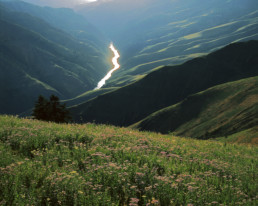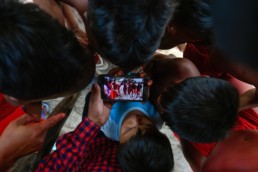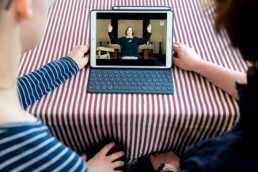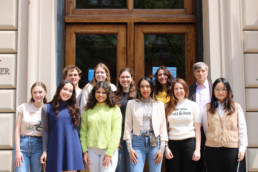'Your Name is Higher Than Covid-19!'
'Your Name is Higher Than Covid-19!'
Kelly Davis | kwd2111@columbia.edu
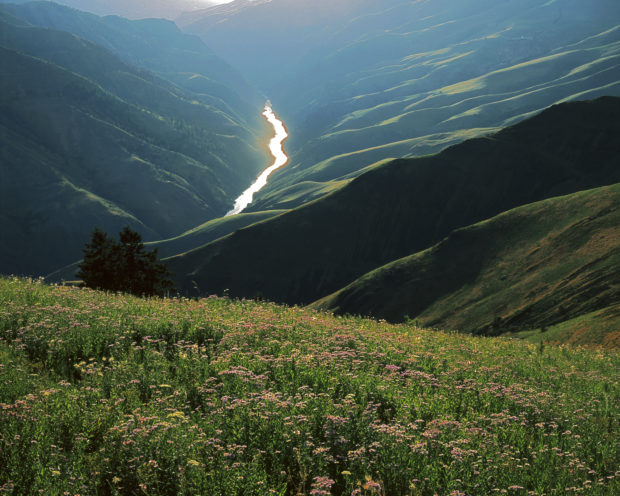
WICHITA, KS. – Seemingly undaunted by an empty church, the worship leader stands at the altar and belts out gospel classics, enthusiastically encouraging the congregation to clap and sing along. His audience, watching at home on Facebook Live, politely obliges.
This has become standard practice for Sunday services at Heart of Christ, a United Methodist Church, in Wichita. For the last two Sundays, in the midst of the rapid spread of the novel coronavirus across the nation, services have moved exclusively online, shaking up church infrastructure and many other houses of worship along the way.
On March 22, Heart of Christ began streaming services online. The church’s Facebook page shared an announcement from the Great Plains United Methodists, which represents parts of Kansas and Nebraska, citing that they would be following CDC guidelines and moving to a digital platform. The statement also says that despite the fear around COVID-19, specifically around the negative financial impact that the virus has had, the bible tells us to “fear not.”
The head pastor of Heart of Christ, the Rev. Ronda Kingwood, put out her own statement, encouraging the church that although the congregation would not be meeting inside church walls, ministry would still continue.
“We will be ministering to our elderly, our single parents, the nursing homes in our community and others that may need help in this time,” Kingwood wrote on March 20.
On March 29, after the worship leader finished his song, Kingwood’s sermon from the church sanctuary seemed fitting for the times. She started off her message with a prayer, encouraging viewers that God is doing a great thing in the midst of the chaos and turmoil in the world. With her emphatic voice, Kingwood said that the origins of the pandemic came straight from the pits of hell and pleaded the blood of Jesus over the virus.
“Your name is higher than Covid-19!” Kingwood proclaimed.
She lifted up in prayer healthcare workers across the globe on the front lines fighting the virus, as well as those suffering from physical ailments.
“Let healing flow through hospital hallways,” Kingwood pleaded.
She prayed that the families of the sick would be strong in this time and asked that people would use common sense to practice social distancing and take the CDC guidelines seriously. She ended the prayer by giving glory and praise to God in the midst of it all.
Kingwood then jumped into the book of Ezekiel, citing the passage in chapter 37 where God brings Ezekiel to the valley of dry bones. Despite the death and decay all around him, Ezekiel still remembers that God is sovereign and that He can “breathe life into these dry bones.” Kingwood related this scripture back to what is happening across the world today. She reminded her congregation that although it may seem like we are all in a dark valley of anxiousness and uncertainty of the future, God’s people should use Ezekiel as an example that He can turn around any situation, no matter how bleak it seems.
Just like Ezekiel, God is showing us that He got this thing,” Kingwood declared. “God can use any situation and then turn it around. There is nothing impossible for our God.”
Sometimes the Body of Christ is a Chocolate Chip Pancake
Sometimes the Body of Christ is a Chocolate Chip Pancake
Madeline Simpson | mms2331@columbia.edu

Associate Pastor David Gungor opens Trinity Grace Church’s service with worship songs. He plays an acoustic guitar, his wife plays the violin, and three other people sing harmony. They all stand at least six feet apart from each other.
After worship, Pastor Michael Rudzena enters the stage and gives a sermon about the biblical character Lazarus, who Jesus raised from the dead. Rudzena speaks of Jesus’ intellectual depth, his emotional intelligence and his hopeful courage as he learns about and mourns his friend’s death. Rudzena addresses an empty chapel.
The service flows from sermon to Eucharist, the Christian tradition of eating bread and drinking wine to honor Jesus’ body and blood. On a typical Sunday, the congregation would approach the front of the church to receive Eucharist from the pastor or church member.
But I know that today is different. I am not in Good Shepherd Chapel, where Trinity Grace holds service—I’m in my parent’s living room in White Bear Lake, Minnesota, watching Rudzena on a flat-screen TV. Instead of wine and bread, I have coffee and a piece of a chocolate chip pancake.
“Last week we said this is the weirdest Eucharist we’ve ever done,” Rudzena says. “But here we are again. Communion is about our connection to each other. Though we are not in the same room, we are deeply connected, not only by God’s spirit but by our love for each other.”
Trinity Grace is one of thousands of houses of worship in the United States and around the world impacted by the coronavirus. On March 21, the White House issued an ordinance for Americans to avoid gatherings of 10 or more people. Most evangelical church services fall in this category, and churches around the nation scrambled to set up technology that would allow the community to continue to meet.
It is the second Sunday in a row that I am attending “virtual church”—a result of social distancing and the “stay-at-home” orders to protect from the COVID-19 virus. The service is aired live on Trinity Grace’s YouTube channel, with a chat capability where congregants can talk in real-time throughout the sermon. I learn that I am not the only one watching out of town.
“Greetings from Baltimore!”
“Hello from two blocks away in Tribeca!”
“Grace and peace, everybody.”
For my church-going family, spending a Sunday morning at home usually meant a snowstorm had shut roads down. Raised in a conservative evangelical home, I grew up going to church a few times a week, including every Sunday morning. Skipping church was not allowed.
But now, we have no choice. My parents’ local church in Minnesota closed in the same way that the churches in New York did. There is nowhere to go on Sunday mornings except YouTube.
We adjust as the world adjusts.
“Let’s let this table move us towards unity in a time of strife,” Rudzena says, leading the online congregation in the Eucharist liturgy. “Let’s join in prayer, and start with gratitude. The Lord is here. His Spirit is with us... We lift our hearts to the Lord… It is right to give thanks and praise.”
And then, around the country, we eat our chocolate chip pancake, our cracker, our sourdough bread, and drink our wine, our coffee, our juice. We recite, separately but together, “Jesus Christ is holy. Jesus Christ is Lord. To the glory of God the Father. Amen.”
'It's a Wake-Up Call'
It's a Wake-Up Call
Rita O. | ro2350@columbia.edu
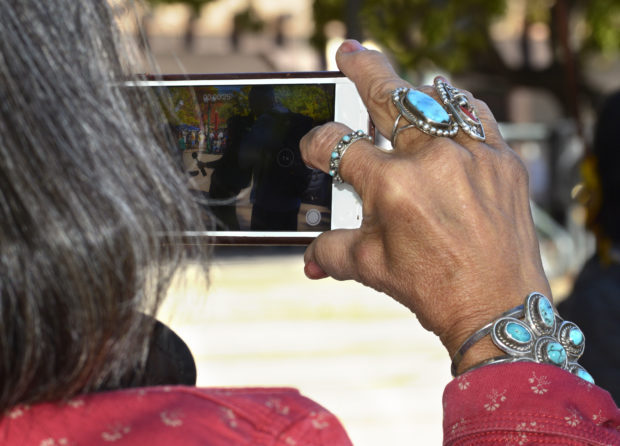
On a rainy Wednesday morning, just days into the COVID-19 outbreak in New York, a Native American leader and her husband left the city by car for a serene village upstate that is surrounded by farms, rivers and streams.
“Mother Earth wants us to take a break,” said the woman who is known as Little Owl. “We figured that this is the perfect opportunity for us to be close to the land.”
Little Owl is the medicine woman of the Oklevueha Native American Church of New York, a community of over 1,000 members practicing spiritual traditions that honors Mother Earth and Father Sky. The New York group is an extension of their main Utah community based on two Native American tribes: Lakota Sioux and Seminole.
As with other faith groups, Little Owl and her community have turned to digital resources to stay connected during the pandemic using the Zoom video conferencing tool, iMessage and WhatsApp. Recently a video was shared through text to the community.
The community is doing its best to continue its ceremonies, heart-opening mantras, live music and drum circles online. But whether in person or online, the goal is the same: connected with the concept of oneness.
In the video that was recently shared, a rugged, graying man with unruly hair stares into the screen. He is the ayahuasca shaman – a healer who uses the plant of the same name - leader of the Amazon.
“In this moment of this world epidemic,” he begins. His words mixed over recorded violins and other string instrumentals. “We now have in our hands the opportunity to heal our heart from fear.”
The video continues highlighting almost-bare women and men in the Amazon, reconnecting with Mother Earth around flaming woods. The video serves as a reminder of what’s interrupted by the current crisis and what’s ahead.
“We have been living from fear for so long,” the shaman in the three-minute video continues. “A movement of healing is being born, a movement that will unite us globally.”
The pandemic is a wake-up call, Little Owl explains. She adds that, if people don’t wake up to change how the earth is treated and how people treat each other, then Mother Earth is going to do something about it. This pandemic, though extreme, could be that “something,” she says. The global crisis is chaotic and one with a divine purpose; it’s a reawaken to listen to the earth they worship.
Oklevueha’s planned ceremonies and rituals for the remainder of the year, like the healing rituals and dance circles, were postponed or canceled. The live, interactive community at large, Little Owl says, is on pause.
Though not ideal, the benefit of their Zoom meetings and group chats is that the community can still “see each other's faces” and stay connected. They can grow together through the uncertainties and remain inspired by sharing videos like the one of the Amazon and joining in on collective meditation while safely at their homes.
“This is the perfect time for us to find that inner peace. And, to find that connection to silence.”
In the countryside now, she already sees a shift in her perspective amid the crisis.
“Where there's a crisis, there is blessing, and there is an opportunity for change,” she says. “The bigger the crisis, the bigger the opportunity we have to shift to a new reality.”
Preaching in the times of Corona
Preaching in the Times of Corona
Zoé Chevalier | zc2504@columbia.edu
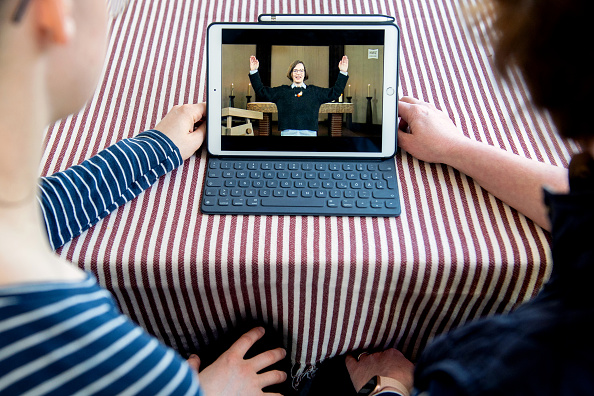
This Sunday is not like any other. There is no singing and dancing, no coming together and hugging at the United Pentecostal Church in Harlem. Instead, Pastor Michael Grattan is alone in his office, preaching on Facebook Live, while comments pour in: “I’m watching from Wisconsin,” says one, many just send “Amen,” another one just says “I made it!”
It was not easy to connect to the Pastor’s sermon this morning. There were technical glitches, and the video stopped in the middle, leaving only a 7-minute segment available. These are the realities of preaching in the times of Corona.
The Church on 125th closed its doors on March 22nd for Sunday services but remains open for weekly prayer and Bible study on Wednesdays and Fridays. There, the few congregants sit on different benches and avoid getting close to each other.
If Bible study became online, the pastor fears that he would lose the back-and-forth conversations that are at the heart of the experience. He also fears that he will have to simplify his lessons because he thinks it is harder to explain complicated concepts online: “I see these TV evangelists,” he says, “they have 10,000 people in one room, but everything they say is so basic.” Especially now in this time of crisis, Grattan says he wants to focus his next lessons on the book of Revelations. “There is a hunger for it,” he says.
The Book of Revelation is the last book of the Christian Bible, written by an unidentified “John”. According to Pastor Grattan, the book recounts how the Antichrist will come down to earth and tempt humans to follow him, those who do will be stained by the “mark of the beast” and have their soul destroyed. This apocalyptic tale fascinates believers according to Grattan, as all try to find resemblances between the text and modern-day life. The virus is only intensifying a question that Christians have been asking themselves for hundreds of years: “Are we in the end times?”
Grattan’s Sunday sermon focused on a more positive message, one of hope: “Once we overcome the fear of death, we are able to overcome all anxieties in life,” he says on the screen, adding: “If we do what we can, God will do what we cannot.”
The cancellation of Sunday service came as a relief to some according to Iris Grattan, the daughter of the pastor. She says that worshippers were worried about sinning by not going to Church to protect themselves from the virus. “[They thought] am I being fearful and not believing in God? Iris says.
Grattan worries about his ability to connect with less technically-savvy members of the community, like those who do not have access to Facebook. Some older members have only an old flip phone, others do not even have a cellphone. Grattan tries to stay connected with them through texting and calling, but he does not know how he will keep the connection strong in the future. “I don’t have answers yet,” he says, “I have never been faced with this before.”
Covering Religion: Faith Wire
Covering Religion: Faith Wire
Although this semester has not turned out as planned, we told important across the globe.
This past winter, as the Omicron variant surged in New York City, we found ourselves rethinking the idea that we were about to reach the light at the end of the tunnel. Initially, we had planned to take a class reporting trip to Israel and Palestine, but unfortunately Columbia University insisted it was unwise to travel under such circumstances. Still, as Covid cases lessened, several members of our class were able to safely travel, domestically, as well as internationally. Thanks to the Scripps Howard Foundation's generous support of Covering Religion, students reported on pressing issues involving religion all over the world.
Here on our website, you'll find stories that take place in Hungary, Italy, Canada, Texas, and of course, New York City. We have chosen the name "Faith Wire: Covering the Changing Face of Religion," as we'd like to share our stories with other publications. Our premise is that religion continues to evolve and we are on the front lines covering the shift. Thus, you will not only find stories here about houses of worship but about the religious implications of everything from the coronavirus to the war in Ukraine.
We hope you will continue to follow us and read our work in these exciting yet uncertain times.
Sincerely,
The editorial team
Covering Religion: Faith Wire

